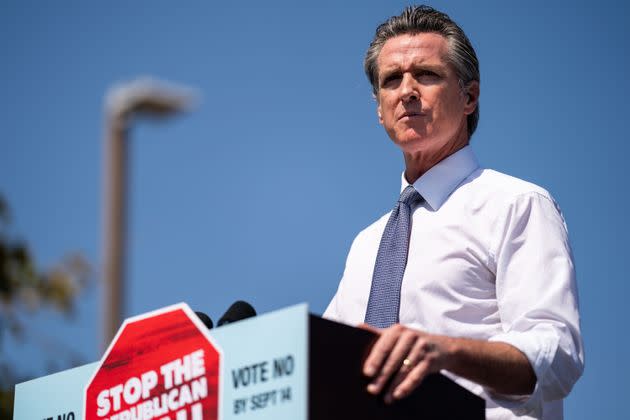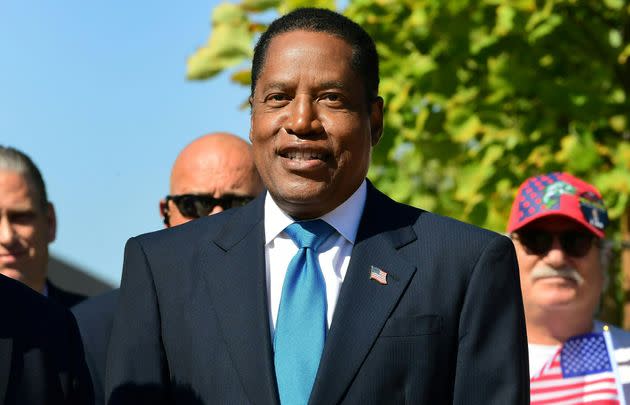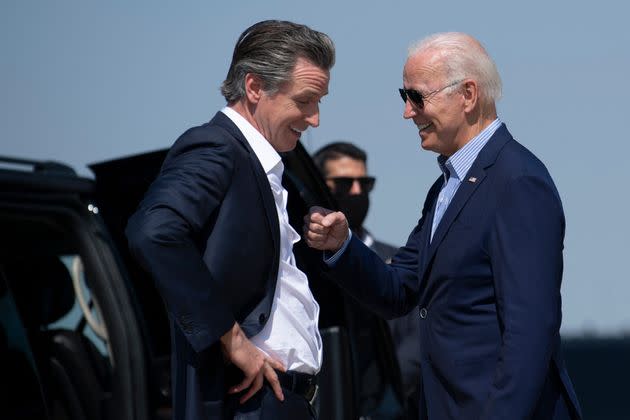How The California Recall Became A Real Threat To Democratic Power
If public polling is correct, California Gov. Gavin Newsom (D) is set to overcome a Republican-led recall effort on Tuesday that briefly frightened Democrats across the country.
But neither Newsom nor the California Democratic Party is likely to emerge from this unusual trial unscathed.
Newsom’s victory would be thanks in no small part to a massive fundraising advantage and the benefit of a far-right Republican opponent, conservative broadcaster Larry Elder, whom Democrats have easily painted as an extreme figure. In other words, a Democratic win would be as much a reflection of the sad state of California’s Republican Party as it would be of the strength of the state’s Democrats.

Indeed, many Democrats in the state are wondering how Newsom allowed such a threat to the party’s rule to take shape. The state, they note, is expected to spend $276 million in public funds just to hold the recall election.
“Most progressives have ample praise for Gavin Newsom, but it is qualified by a frustration that he could accomplish even more,” said Paul Kumar, a progressive California strategist who is supportive of Newsom but acknowledges the administration’s shortcomings. “The governor has faced enormous challenges, from COVID and wildfires to drought and power shortages, but he has also made choices that left him vulnerable, and a less-extreme Republican opposition might have” succeeded in recalling him.
Newsom has faced enormous challenges ― the COVID-19 pandemic, out-of-control wildfires and a spike in violent crime that has swept many other states. Perhaps the greatest challenge is a recall system that empowers a small minority in the state to force a referendum on elected officials and subsequently elect a replacement.
It shows you the level of disgust at this governor.Eric Early, spokesperson, Recall Gavin Newsom
In the months preceding the recall election, however, Newsom made errors that some critics believe speak to his flaws as a leader, and others chalk up to a deeper complacency that has set in among the state’s hegemonic Democrats.
Those mistakes included political missteps, such as his infamous unmasked meal with lobbyists at the luxurious French Laundry restaurant in November and a decision not to fight recall petitioners’ efforts to extend the signature collection period by four months.
He is also guilty of policy errors, including mismanaging the state’s unemployment insurance system, failing to provide more immediate relief for the housing and homelessness crisis, and touting an economic recovery that is still very uneven.
“Win or lose, [Newsom] should understand that he wouldn’t have been in danger of being dethroned had he conducted himself more judiciously,” columnist Dan Walters wrote for the nonprofit Sacramento-based news outlet CalMatters.

‘A Moment Of Introspection On Direct Democracy’
California is one of 19 states in the country that allows voters to trigger an off-year election on whether to expel an elected official from office before the completion of their term. But it has a lower threshold for initiating a recall than several other states. For example, Colorado, Wisconsin and Michigan require recall petitioners to collect the signatures of a number of voters equivalent to 25% of the previous gubernatorial election vote in a given state or district, while California requires the signatures of just 12% of the previous gubernatorial vote in order to trigger a recall election.
Partly as a result, the Golden State has a rich history of recall elections, including the 2003 recall of Gov. Gray Davis, a Democrat who was replaced by GOP celebrity Arnold Schwarzenegger. It is also home to a permissive voter referendum system that has enabled voters to directly shape policy by ballot initiative on issues ranging from same-sex marriage to the employment status of gig workers.
As California Republicans’ electoral fortunes have declined in statewide elections and in liberal cities, they have escalated their use of the recalls to obtain power. Prior to this recall election, there were several unsuccessful bids to get a Newsom recall on the ballot. And conservative critics of progressive Los Angeles County District Attorney George Gascón, and Los Angeles City Council members Nithya Raman and Mike Bonin are also seeking to recall them, though it is not yet clear whether they will succeed in placing the question before voters.
Notwithstanding the many conservative failures to get recalls on the ballot, California’s recall-friendly political system can sometimes lead to situations where momentary spikes in public displeasure that elected officials in other states have the chance to ride out can prompt an expensive and sometimes consequential statewide election in an off-year. Newsom underwent a dip in popularity as California got hammered by the second wave of COVID-19 last fall and winter ― and voters reeled from the revelation that Newsom appeared not to be practicing what he preached ― but he has since recovered much of the ground he lost in voter approval ratings.
There was no better environment for Republicans, and they’re going to lose by double digits.David Dayen, The American Prospect
To many progressives fed up with the recall process, Newsom is, more than anything, a victim of circumstance whose biggest mistake was declining to fight the conservative recall movement leaders when they went to court seeking an extra four months to collect petition signatures in November.
The two-part nature of the recall vote is especially frustrating to critics of the process. Newsom, who was elected in 2018 with more than 60% of the vote, must obtain a simple majority of the recall electorate to survive the ballot question of whether to keep him in office.
But on the second ballot question, on who will replace Newsom with if he is recalled, any of Newsom’s opponents requires a mere plurality. In the current crowded field of challengers, the ultra-conservative Elder leads, but an average of current polls suggests Elder has the support of just one-quarter of recall voters.
“There was no better environment for Republicans, and they’re going to lose by double digits,” said David Dayen, a Los Angeles resident and executive editor of the progressive outlet The American Prospect.
Dayen hopes that frustration with the Newsom recall might fuel public support for reform of the recall process, if not its outright abolition. New polling data indicates he is right.
“It should be a moment of introspection on direct democracy,” he said.
The recall’s proponents maintain that it is a fundamental part of California’s political culture.
“This is right out of our Constitution here in California,” said Eric Early, an attorney and spokesperson for Recall Gavin Newsom, the umbrella pro-recall group.
Early also noted that Newsom is just the fourth sitting governor in U.S. history to face a recall election.
“It shows you the level of disgust at this governor,” Early said.

A Scandal That Reflected Deeper Frustrations
The moment that embodies public outrage at Newsom’s handling of the pandemic is his infamous dinner in November at the luxurious Napa Valley restaurant The French Laundry, where some meals cost upwards of $450 per person.
Photos of the dinner ― a birthday soiree for a powerful Newsom ally and Golden State lobbyist ― showed the governor and other attendees eating indoors without masks.
At the time, California, which already had some of the strictest masking and social-distancing requirements in the country, was girding for the second wave of the COVID-19 pandemic. State officials had begun warning against large Thanksgiving gatherings; weeks after the dinner, the state’s re-prohibition of outdoor dining would take effect.
Newsom apologized for the incident, conceding, “The spirit of what I’m preaching all the time was contradicted, and I’ve got to own that.”
But the apology didn’t blunt the political impact. The incident turbocharged the recall effort just as petitioners got their extra four months to collect signatures.
That’s because the “French Laundry scandal” embodied so much of the public’s frustration with Newsom, crystallizing a sense that he is an out-of-touch elite unwilling to share in the sacrifices he imposes on Californians.
“A number of working-class Californians look at that and say, ‘He lives in a different universe than I do. He’s telling me what I can and can’t do during the pandemic but won’t abide by the same standards’” said Kumar, who nonetheless praises many of Newsom’s policies and has been organizing opposition to the recall.
Historically, Newsom has been better at vision than at implementation.Paul Kumar, progressive strategist
It didn’t help matters that in October 2020 it emerged that Newsom’s four young children would be returning to private school for in-person learning at a time when many of the state’s largest public school districts were not yet reopening. And small-business owners lamented that Newsom’s November 2020 stay-at-home order exempted Hollywood studios, which have more financial and political clout than mom-and-pop-owned restaurants.
Michael Shellenberger, a Berkeley resident and founder of the moderate think tank Environmental Progress, voted for Newsom in 2018 but said he is now voting to recall him in favor of Kevin Faulconer, a moderate Republican and former San Diego mayor.
He sees Newsom’s coziness with the lobbyists present at the French Laundry dinner as evidence of his “check-the-box” approach to governing, in which he constantly seeks to assuage business, labor and environmental groups rather than embark on needed reforms that might anger them.
“Those are interests that have to be challenged, not just pandered to,” he said.
In addition, Newsom has often shown a lack of enthusiasm for the nuts and bolts of governing ― whether it’s maintaining a rapport with individual voters or overseeing the successful execution of policy details ― that has frustrated even many progressives who are otherwise pleased with his governance.
For example, at the height of the pandemic, the state’s Employment Development Department failed to pay out unemployment insurance claims for an untold number of jobless Californians. The agency nonetheless distributed at least 10% of its pandemic unemployment benefits to fraudulent applicants ― a sum that could total $31 billion.
Newsom has also caught flak for awarding a $15 million no-bid contract to the insurance company Blue Shield of California, a major Newsom donor, to help distribute the COVID-19 vaccine. Critics believed the insurer was never the right party for the role, and the company has endured criticism for the initially slow pace of the vaccine rollout, among other problems.
“Historically, Newsom has been better at vision than at implementation,” Kumar said.

‘Nothing Has Worked’
California voters who support the recall often report a general sense of dissatisfaction with multiple problems facing the state.
Cynthia Rojas, a Culver City small-business owner and mother of public school kids, told CalMatters that she signed the petition because she believes Democrats have been too deferential to teachers unions opposed to school reopenings.
“A lot of us were like, ‘Why aren’t the Democratic politicians standing up for us?’” said Rojas, who told CalMatters that when she voted in the past, she chose Democrats. “Democrats were always supposed to be for the little guy.”
Other complaints include skyrocketing homelessness, which increased 24% from 2018 to 2020.
Polling earlier this summer showed “homelessness” and “housing prices” tied as top concerns for California voters.
One reason it’s such a concern is that, unlike in many other states, 70% of the state’s homeless population is unsheltered, leading to public dissatisfaction with encampments in places like Venice Beach in Los Angeles.
Max Franklin, a mariner from the East Bay area outside San Francisco, told HuffPost that he voted for Newsom in 2018 but is now voting to recall him and elect Elder. He cited rising homelessness and violent crime. (The data are mixed across the state, but as of July, murders in Oakland, in particular, had gone up 30% relative to their level at that time last year.)
“I’ve been reading up on things and looking at the policies that Newsom has put through, and in my opinion nothing has worked,” Franklin said.
The ambivalence of Latino voters toward Newsom has been a particular source of concern and confusion for Democrats. A little over a month ago, an Emerson College poll showed that Latinos were the only racial group in which a narrow majority of voters are supportive of the recall.
Those numbers have shifted dramatically in just a few weeks with a new Emerson poll conducted on Friday and Saturday showing two-thirds of Latinos opposed to the recall.
Gustavo Arellano, a registered Democrat and Mexican American columnist for the Los Angeles Times who frequently comments on Latino voting patterns, believes that Newsom’s failure to lock in Latino support early should still be a wake-up call for Democrats who have taken Latinos for granted for too long. He believes that the party’s struggles with Latino voters, who skew blue collar, correlate closely with Democrats’ growing difficulty connecting with non-college-educated voters of all backgrounds.
Win or lose, Democrats own the problems in California.Michael Shellenberger, Environmental Progress
While Latino voters generally support labor unions and government programs to make education and health care more affordable, Arellano warns that they sometimes lean more conservative on so-called social issues, such as the stringency of COVID-19 lockdowns, aggressive police reform policies and even climate policy.
“You are going to see more and more Latinos who do not like progressive politics,” Arellano said, while making it clear that he is not one of those Latinos. “They feel fundamentally offended by a victimhood mentality.”
Progressives, for their part, insist that Newsom’s problems can be traced to his refusal to adequately follow through on his campaign commitments. They point, for example, to his willingness to increase the number of oil and gas permits from 2019 to 2020 as evidence that he is not serious enough about climate change.
Joe Sanberg, a Los Angeles entrepreneur, philanthropist and progressive activist working against the recall, also faulted Newsom for presiding over an economic recovery that has benefited big corporations more than small businesses and workers.
“When you consider voters who are experiencing climate catastrophe on their front steps and people who haven’t been able to get their jobs back or reopen their businesses, they’re really frustrated with the governor and with the Democratic Party,” Sanberg said.
Regardless of their differences, though, Newsom’s moderate and progressive critics agree that California is falling short of its promise for ordinary people, and as the governing party with a veto-proof supermajority, the buck stops with Democrats.
“Democrats don’t have anybody to blame these problems on. They’ve just been in power too long,” Shellenberger said. “Win or lose, Democrats own the problems in California.”

Larry Elder And The Delta Variant Buoy Newsom
If there’s one man Democrats can thank for Newsom’s anticipated victory, it’s Elder, his main Republican opponent.
Earlier on in the recall fight, Newsom and his team tried to sell Californians on the merits of his governorship.
His first TV ad against the recall, in mid-June, celebrated the increased cash payments that Newsom sent to a select group of vulnerable California families. “Gov. Gavin Newsom has California roaring back,” the narrator says.
A second spot uses images of former President Donald Trump, former Arkansas Gov. Mike Huckabee and former House Speaker Newt Gingrich to argue that the recall effort is an extension of Republicans’ passage of “voter suppression laws across the country.”
Neither the appeal to Newsom’s record nor the effort to brand the recall as a vaguely Republican plot succeeded in moving the poll numbers, however.
But Newsom’s fortunes turned in recent weeks as it became clear that the alternative to his governorship was the leadership of Elder, who is considerably to the right of the typical California voters on a number of key issues, from health care to abortion rights.
Newsom has argued that Elder is “to the right of Donald Trump,” noting that Elder has expressed opposition to the existence of the minimum wage and Medicaid.
Larry Elder, no doubt, has a lot of extreme views.Nathan Click, spokesperson, Stop the Republican Recall
And with the spread of the delta variant of COVID-19, Newsom has seized on Elder’s opposition to vaccine mandates and an interview of an anti-vaccine conspiracy theorist on his radio show. (Elder is vaccinated but believes it should be a personal choice.)
Elder’s opposition to vaccine mandates for California public schools and other institutions would threaten “school closures and our recovery,” a mid-August Newsom ad states. The ad features a photo of Elder with Trump.
“Larry Elder, no doubt, has a lot of extreme views,” said Nathan Click, a spokesperson for Stop the Republican Recall. “But if you look at what we’ve been putting the most money into on TV, our contrast for the last four weeks has been about how Larry Elder is opposed to vaccine mandates. That’s true of every major Republican on the recall ballot.”
Click also attributed Newsom’s rise in the polls to an early enthusiasm gap between Democrats and Republicans that closed as the election approached and Democrats began to countenance the possibility of Elder or another Republican as governor.
To get Democrats to appreciate the stakes of the election, Newsom has benefited from the help of leading national figures in the Democratic Party, such as former President Barack Obama, Sen. Elizabeth Warren (D-Mass.) and Sen. Bernie Sanders (I-Vt.) ― all of whom have recorded TV ads on his behalf. President Joe Biden was scheduled to headline an anti-recall rally with Newsom in Long Beach on Monday evening.
“We’re not counting our chickens before they hatch, but we are feeling positive,” Click said.
This article originally appeared on HuffPost and has been updated.

 Yahoo Finance
Yahoo Finance